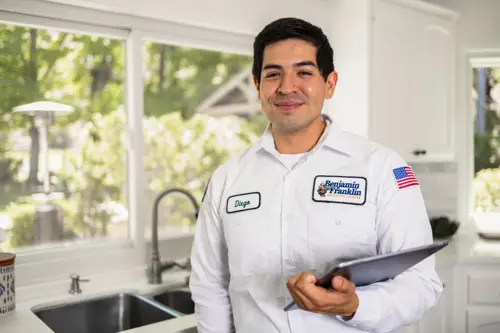 Your plumbing system may be out of sight, but it only stays out of mind as long as everything is working properly. Unfortunately, by the time things start going sideways, it may already be beyond a simple fix. To solve serious systemic problems, investing in whole-house repiping may be the smartest solution.
Your plumbing system may be out of sight, but it only stays out of mind as long as everything is working properly. Unfortunately, by the time things start going sideways, it may already be beyond a simple fix. To solve serious systemic problems, investing in whole-house repiping may be the smartest solution.
Of course, repiping an entire plumbing system is no small task, so it’s important to consider whether it’s the right option for you. While every home is unique, here are several key factors to evaluate before making a decision.
Age and Pipe Material
All plumbing systems come with an expected lifespan, which can vary significantly depending on the materials used. Brass, copper and cast iron can typically last 70 to 80 years or more. For PVC piping, those numbers drop to around 25 to 50 years. Naturally, shoddy workmanship or low-quality materials can shorten your plumbing’s lifespan even further.
While it’s not a hard-and-fast rule, repiping your system before it reaches its life expectancy can often save you a lot of trouble. That’s especially true of certain older materials that carry risks far beyond age and condition. For instance:
Lead Pipes
In theory, strong and durable lead pipes are built to last up to a century under normal use. In practice, however, we now know they can leach potentially dangerous amounts of lead directly into your drinking water. If your home has lead pipes, it’s imperative to make plans for replacing them as soon as possible.
Polybutylene Pipes
Unlike lead plumbing, polybutylene (PB) pipes won’t slowly poison you with every glass of water you drink. What they may do, however, is suddenly and catastrophically fail with little to no warning. In fact, as PB piping gained popularity in the 1980s and 1990s, this type of failure became so common and damaging that it gave rise to one of the nation’s largest class-action lawsuits. Needless to say, any polybutylene pipes in your home are past due for replacement.
Galvanized Steel Pipes
Galvanized pipes are simply steel pipes coated in a layer of zinc to prevent corrosion. Unfortunately, that zinc layer can’t stick around forever. After around 40 years, most galvanized piping will have begun corroding and accumulating harmful mineral deposits — including lead. While replacing galvanized pipes isn’t completely necessary in all situations, it’s often the safest option for your home and your family.
Low Water Pressure
Have you noticed the flow from your faucets and showerheads getting weaker and weaker? Has it been taking longer than expected to fill up your dishwasher or washing machine? Low water pressure has many potential causes, from bad valves and pressure regulators to well failures and water main breaks. More often, however, it’s the result of corrosion slowly and steadily building up inside your piping. This gradually reduces the effective diameter of the pipes, restricting the flow of water reaching your fixtures.
Signs of Pipe Corrosion
Speaking of corrosion, it’s not just the insides of your pipes you need to worry about. Any piping around your home that’s accessible should be periodically inspected for signs of corrosion or damage. This may include rust, discoloration, flaking, dimpling, pitting or anything else that appears unusual. Minor exterior corrosion is rarely an emergency, but it can be an early sign warning of more serious problems.
Recurring Plumbing Leaks
Leaky plumbing is always a hassle, but a small leak in an isolated area can usually be fixed without much trouble. If you’ve got your local emergency plumbers on speed dial, however, you may have much bigger problems. Frequent, recurring leaks indicate your piping is likely headed for disaster, especially when they occur in multiple areas around your home. Major plumbing failures can cause tremendous property damage, so there may be little time to waste.
Poor Water Quality
Has your normally clean, tasty water been replaced by something that looks — and smells — like it’s straight from the swamp? You probably don’t need an expert to tell you something is very wrong. More specifically, this usually indicates the presence of heavy corrosion inside your plumbing system. If only the hot water is affected, the solution may be as simple as flushing or replacing your water heater. Otherwise, you’re likely dealing with widespread corrosion that can only be addressed with a full repiping.
Loud and Noisy Plumbing
A healthy plumbing system may not be silent, but it certainly shouldn’t sound like evil spirits trapped inside your piping. Whether it’s squealing, shrieking, knocking or gurgling, loud and unusual noises coming from your pipes should never be ignored. These sounds occur for many reasons, including excessive corrosion, clogged or damaged pipes, worn-out components, water pressure issues and more.
If your plumbing system has given you cause for concern, put your mind at ease with a call to Benjamin Franklin Plumbing of Pompano Beach. Our highly qualified plumbing professionals can perform a complete in-home evaluation and help you determine whether whole-house repiping makes sense for you.